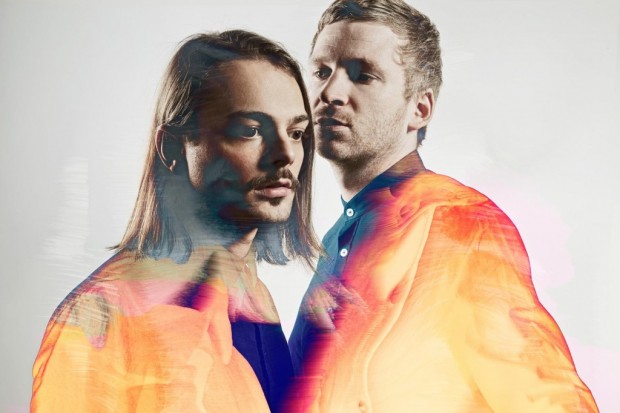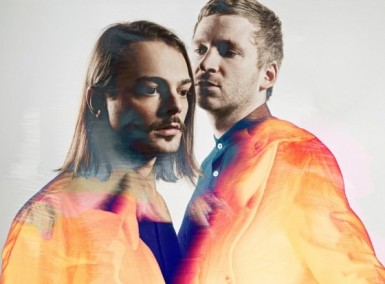 It seems to be quite a trend to mix classical and electronic music at the moment. One of the most interesting acts in this new genre is KIASMOS, the side project of neo-classic composer ÓLAFUR ARNALDS and his friend, the electronic producer Janus Rasmussen (from the band BLOODGROUP). The two Icelandic musicians will finally release their anticipated, self-titled debut album on October the 27th. Having that in mind, NOTHING BUT HOPE AND PASSION didn’t hesitate long as it was made official that the band would play at this year’s Dockville Festival and had a short conversation with one part of the duo, ÓLAFUR ARNALDS before their late-night gig.
It seems to be quite a trend to mix classical and electronic music at the moment. One of the most interesting acts in this new genre is KIASMOS, the side project of neo-classic composer ÓLAFUR ARNALDS and his friend, the electronic producer Janus Rasmussen (from the band BLOODGROUP). The two Icelandic musicians will finally release their anticipated, self-titled debut album on October the 27th. Having that in mind, NOTHING BUT HOPE AND PASSION didn’t hesitate long as it was made official that the band would play at this year’s Dockville Festival and had a short conversation with one part of the duo, ÓLAFUR ARNALDS before their late-night gig.
What does the name ‘Kiasmos’ stand for?
Actually it is spelled ‘Chiasmos’, with a C and an H. It means that you’re using an oxymoron in a sentence. Basically it’s about contrasts and opposites – it’s a grammatical term. You could say something like: ‘The distraction was beautiful’ – complete opposites. And when you’re using it in a sentence it’s a chiasmos. We thought it was really fitting because we’re working a lot with opposites in our music.
In this case the opposite electronic and classical music?
Yeah.
How did you meet the other part, Janus Rasmussen?
Before I started making music as a my job, I was a sound technician. I was the house technician of this venue in Iceland. Janus was in a popband that was playing there a lot. I was doing the sound for them. I went on tour with them and some day we started playing around and making music together.
Your collaboration started back in the year 2009. Why did we have to wait so long for your debut record?
Because we never wanted this to be our job. We wanted this to stay in the way it always has been: two friends are meeting up, having a beer and making some beats. We didn’t really want to plan anything because then you’re not doing it because you want to, you’re doing it because you have to. And this is kind of a sacred haven for us because there is so much going on in our other projects and it’s so busy, there’s always a deadline, it’s always touring, always expectations. To have something where we can make music differently, just hanging out. But then I guess after a few years of we had the feeling to finally get something out.
How does one of your sessions look like?
Usually it’s very informal. We come to the studio, hang out and chat a little bit and then somebody’s turning on the drum machine. We never plan or decide what we’re gonna do, we just start playing. What happens, happens. Sometimes Janus uses a drum machine, making a beat while I’m at the piano and we start improvising.
How would you describe your music to a deaf person?
Something where you have a kind of ground which is under your feed. Like the base ground of the beats. But it also has something upper, affect-arising motives. Does that even make sense? (laughs)
What do you want to express with your music? What should it do with the listener?
It’s not really up to us. We once said that we wanted to make music for people who are tired of dancing only with their feet, who want to dance with their head, too. But I always said that I don’t make music for a specific purpose, except when I’m doing music for a film or something. I find it much more interesting when people interpret it in different ways, it means something completely different to you than to another person.
As you’re both from Iceland- do you see a difference between the Icelandic and the European music scene?
Yeah, but I also see a difference between for example the German and the Danish music scene and so on. Every scene is different and that’s all affected by our cultures, our environment and history. Iceland is very small and very affected by the smallness and closeness of everything. Everybody is kind of working with each other, everybody’s playing in different bands- playing drums in this band and then doing the sound for another band. I think that is kind of effecting the end result of the music.
As we are at a festival right now, do you visit festivals a lot or are you just playing them?
I never go as part of audience. I saw a lot of festivals and I didn’t like it. When you play festivals as an artist it kind of ruins it for you.
Oh really? Why?
I don’t know. You see it from behind and it’s not exiting anymore to go as a visitor.
So what don’t you like about festivals then?
I just don’t like staying at a concert for so long. I like going to concerts for maybe two hours, then going home and think about it, reflecting on it. Festivals with so much going on is not really my type of things. It’s just too much. Too much music.
Who do hope and passion mean to you?
Passion is what I do, what I live for. And hope is changing every day. You need something to hope for every day.
—
